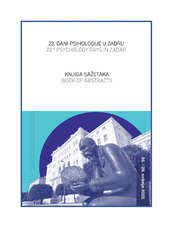Prikaz osnovnih podataka o dokumentu
Mental health of refugees and migrants: predictive potential of traumatic experiences during transit
| dc.creator | Vukčević Marković, Maša | |
| dc.creator | Šapić, Draga | |
| dc.creator | Bobić, Aleksandra | |
| dc.creator | Dimoski, Jana | |
| dc.creator | Živanović, Marko | |
| dc.date.accessioned | 2023-09-22T14:09:13Z | |
| dc.date.available | 2023-09-22T14:09:13Z | |
| dc.date.issued | 2022 | |
| dc.identifier.isbn | 978-953-331-382-5 | |
| dc.identifier.uri | http://reff.f.bg.ac.rs/handle/123456789/4873 | |
| dc.description.abstract | There are 26 million refugees around the world, while in European Union in 2019 there has been an increase of 11% of asylum applications. The Western Balkans route is still one of the main migration routes to Europe, a desired end location of the journey. During transit, refugees and migrants are at risk of various issues regarding safety, such as torture, and sexual and labour exploitation, and numerous studies reported impaired mental health and wellbeing of refugees and migrants on transit routes. The aim of this study was to assess stressful and traumatic experiences of refugees and migrants during transit, with a special focus on the experience of pushback, as well as the impact of these stressful and traumatic experiences on refugees’ and migrants’ mental health and well-being. A total of 201 refugees and migrants completed Stressful and Traumatic Experiences in Transit questionnaire – short version (SET-SF), questionnaire for assessing stressful and traumatic experiences during pushback (SET-SF PB), Refugee Health Screener (RHS-15; α = .77 - .82), and Well-being index (WHO-5; α = .84). The results showed that the average number of experienced stressful and traumatic events is notably high (M = 10.27, SD = 4.85). Moreover, 50.7% and 37.8%, and 32.3% of the participants experience severe symptoms of depression, anxiety, and PTSD, respectively. The results indicated that stressful and traumatic events experienced during transit predict the severity of depression, anxiety, and PTSD symptoms. Furthermore, symptoms of PTSD predict psychological well-being. The study gives additional insights regarding risk factors refugees and migrants are exposed to during transit, and their impact on the mental health and wellbeing of refugees and migrants. The practical implications of the study are discussed, and the need for the provision of adequate and comprehensive support is stressed. | sr |
| dc.language.iso | en | sr |
| dc.rights | openAccess | sr |
| dc.rights.uri | https://creativecommons.org/licenses/by/4.0/ | |
| dc.source | Book of abstracts - 23rd Psychology Days in Zadar | sr |
| dc.subject | refugees and migrants | sr |
| dc.subject | traumatic experiences | sr |
| dc.subject | mental health | sr |
| dc.subject | wellbeing | sr |
| dc.title | Mental health of refugees and migrants: predictive potential of traumatic experiences during transit | sr |
| dc.type | conferenceObject | sr |
| dc.rights.license | BY | sr |
| dc.citation.spage | 154 | |
| dc.description.other | 23 rd Psychology days in Zadar, International Scientific Psychology Conference May 26 – 28, 2022, Zadar, Croatia | |
| dc.identifier.fulltext | http://reff.f.bg.ac.rs/bitstream/id/11894/bitstream_11894.pdf | |
| dc.identifier.rcub | https://hdl.handle.net/21.15107/rcub_reff_4873 | |
| dc.type.version | publishedVersion | sr |

